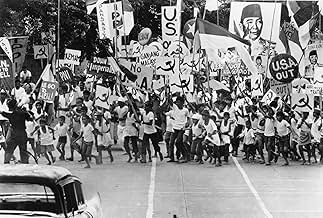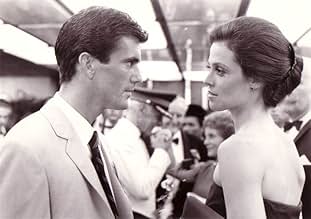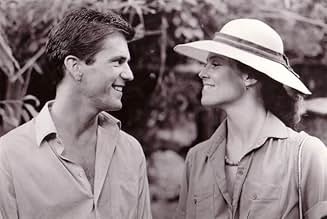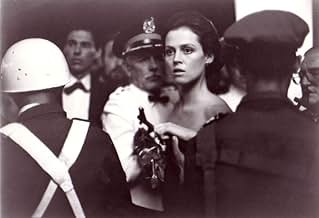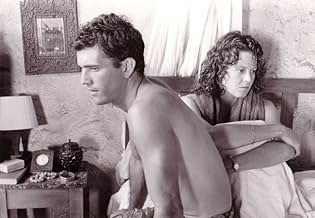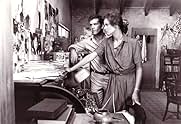VALUTAZIONE IMDb
7,1/10
24.106
LA TUA VALUTAZIONE
Un giovane reporter australiano cerca di affrontare le turbolenze politiche dell'Indonesia durante il governo del presidente Sukarno con l'aiuto di un fotografo.Un giovane reporter australiano cerca di affrontare le turbolenze politiche dell'Indonesia durante il governo del presidente Sukarno con l'aiuto di un fotografo.Un giovane reporter australiano cerca di affrontare le turbolenze politiche dell'Indonesia durante il governo del presidente Sukarno con l'aiuto di un fotografo.
- Regia
- Sceneggiatura
- Star
- Vincitore di 1 Oscar
- 10 vittorie e 14 candidature totali
Recensioni in evidenza
One of the most perfect movies ever made. A true slice of life - what art is supposed to be all about. The music is extraordinary - note how Jarre uses it (and I will say no more for fear of spoiling the effect). No, this wasn't filmed on location, but I don't think that should matter, as the ability of the film to evoke a place and a period is remarkable. I first saw this movie by chance; I have owned it ever since. It's one of these rare movies that are made as an artist is climbing upwards in career but not yet devoured by the commercial interests who will notice and try to effect a lucrative transformation.
I am a little amazed that, so far, only 40 comments have been entered. Fortunately most are of high quality, and all the important points related to the film are clearly highlighted. So, I will not repeat what has been well said by others. I want to explain one additional point, it has to do with my personal experience but might be interesting to mention.
I'm a professional expatriate, living overseas for 25 years. I'm not talking about an American in Paris or an Englishman in New York, I mean African steppes, tropical jungles, Indian slums. Living in a totally foreign country, in a totally strange culture, imperfectly understanding the local language, bewildered by alien logic, you experience a permanent sense of unease. You adapt, you learn to cope, you make what you hope are friends. But you never forget that you are a stranger in unknown territory, and that you are vulnerable.
You may peacefully walk on the street one minute, the next minute bullets are flying all around you. In the evening you have a pleasant drink with your neighbour, in the morning you are arrested, accused of being a foreign mercenary. When you travel inland you come at a road block, not knowing if they'll let you pass, or harass you for a couple of hours, or confiscate your car. As a foreigner in developing countries, you are constantly confronted with uncertainty, an intangible menace lurking around the corner.
I find that TYOLD transmits this sense of menace very poignantly. Many people have commented on its brilliant sense of place, the accurate depiction of Indonesia and the events that took place at the time. Others mention that you get a very real feeling of the tension and uncertainty journalists in times of upheaval are subjected to. But I would like to extend it beyond journalists. The sense of menace in TYOLD is eminently recognizable by all who have lived in countries where the police is not there to protect you, the laws are not there to make society more civilized, the hospitals are not there to cure you. In TYOLD, the menace is made visible because of the troubles that erupt, but usually you do not have to live through civil war when overseas. Still, the menace is not less real, and the sense of foreboding haunting every expatriate was very convincingly conveyed in the film.
I'm a professional expatriate, living overseas for 25 years. I'm not talking about an American in Paris or an Englishman in New York, I mean African steppes, tropical jungles, Indian slums. Living in a totally foreign country, in a totally strange culture, imperfectly understanding the local language, bewildered by alien logic, you experience a permanent sense of unease. You adapt, you learn to cope, you make what you hope are friends. But you never forget that you are a stranger in unknown territory, and that you are vulnerable.
You may peacefully walk on the street one minute, the next minute bullets are flying all around you. In the evening you have a pleasant drink with your neighbour, in the morning you are arrested, accused of being a foreign mercenary. When you travel inland you come at a road block, not knowing if they'll let you pass, or harass you for a couple of hours, or confiscate your car. As a foreigner in developing countries, you are constantly confronted with uncertainty, an intangible menace lurking around the corner.
I find that TYOLD transmits this sense of menace very poignantly. Many people have commented on its brilliant sense of place, the accurate depiction of Indonesia and the events that took place at the time. Others mention that you get a very real feeling of the tension and uncertainty journalists in times of upheaval are subjected to. But I would like to extend it beyond journalists. The sense of menace in TYOLD is eminently recognizable by all who have lived in countries where the police is not there to protect you, the laws are not there to make society more civilized, the hospitals are not there to cure you. In TYOLD, the menace is made visible because of the troubles that erupt, but usually you do not have to live through civil war when overseas. Still, the menace is not less real, and the sense of foreboding haunting every expatriate was very convincingly conveyed in the film.
In "The Year of Living Dangerously" director Peter Weir attempts much and accomplishes most of his goals. It's a socio-political essay on the dangers of Western meddling in Third World countries. It's a fascinating view into the challenges of journalism in a volatile foreign country. It's a steamy romance involving two beautiful, intelligent characters. It's a distinctly Far Eastern morality play that seems to delight in yin/yang paradoxes. Plus it's one of the best films at evoking the mood, texture, and sensuality of life in Southeast Asia. Don't be too harsh on Weir for the lapses in historic accuracy and plotting, because it's a complicated, busy landscape he is painting here. The best things about the film are:
-Linda Hunt's amazing performance. Unlike other gender-bending performances (Julie Andrews in "Victor/Victoria", Dustin Hoffman in "Tootsie") you never once give any thought to the fact that this is a woman playing a man. It's a seamless transition and a performance of immense heart and honesty. The image of a distraught Billy pounding at his typewriter, pleading "What then must we do?" while an aria swells around him and the eyes of Jakarta's poor stare at him from his own photographs, is an incredibly moving scene.
-The atmosphere created by the combination of Russell Boyd's cinematography and Maurice Jarre's score. Take a look at the scene with Weaver walking through the streets of Jakarta in a tropical downpour. The effect is breathtaking.
-The chemistry between Gibson and Weaver. You can feel the heat between them. Unlike other posters here, I believe their romance is one of the film's strong points.
I agree that the ending is a bit of a letdown, but it doesn't diminish Weir's accomplishments. "The Year of Living Dangerously" is a startling unique film, and certainly one his best.
-Linda Hunt's amazing performance. Unlike other gender-bending performances (Julie Andrews in "Victor/Victoria", Dustin Hoffman in "Tootsie") you never once give any thought to the fact that this is a woman playing a man. It's a seamless transition and a performance of immense heart and honesty. The image of a distraught Billy pounding at his typewriter, pleading "What then must we do?" while an aria swells around him and the eyes of Jakarta's poor stare at him from his own photographs, is an incredibly moving scene.
-The atmosphere created by the combination of Russell Boyd's cinematography and Maurice Jarre's score. Take a look at the scene with Weaver walking through the streets of Jakarta in a tropical downpour. The effect is breathtaking.
-The chemistry between Gibson and Weaver. You can feel the heat between them. Unlike other posters here, I believe their romance is one of the film's strong points.
I agree that the ending is a bit of a letdown, but it doesn't diminish Weir's accomplishments. "The Year of Living Dangerously" is a startling unique film, and certainly one his best.
This excellent movie is set in 1965 Indonesia, when an Australian reporter named Gay Hamilton is assigned on his first work as a foreign journalist. His apparently simple mission to Yakarta soon turns hot when he interviews a rebel leader , while President Sukarno was toppling by pressure left from communists and right from military. Guy soon is the hottest reporter with the help of his photographer, a native, half- Chinese midget named Kwan . Eventually Hamilton must confront moral conflicts and the relationship between Billy and him reaches some problems connected with a British diplomatic attaché , at the same time the political upheaval takes place in coup détat.
Mel Gibson is good as correspondent covering a conflict and finding himself becoming personally involved when he befriends a free-lance photographer named Billy Kwan and falling for a beautiful Embassy assistant, a mesmerizing Sigourney Weaver .The movie has its touching moments found primarily in the superb supporting performances as Michael Murphy as lively journalist , Bill Kerr as veteran Colonel and of course diminutive Linda Hunt who steals the show as sensible photographer in her Academy Award-winning character, a woman acting a man, and well deservedly prized. Moving and intimate musical score though composed by synthesizer by Maurice Jarre. Atmospheric cinematography that adequate as a mood-piece by Russell Boyd.
The motion picture is stunningly directed by Australian director Peter Weir who achieved several hits (Witness, Gallipoli, The last wave) and some flop (Mosquito coast, The plumber). The movie belongs to sub-genre that abounded in the 80s about reporters around the world covering dangerous political conflicts , such as Nicaragua in ¨Under fire¨ by Robert Spottswoode with Nick Nolte , Gene Hackman and Joanna Cassidy, Salvador in ¨Salvador¨ by Oliver Stone with James Woods and James Belushi, and Libano in ¨Deadline¨ by Nathaliel Gutman with Christopher Walken and Hywel Bennett. These movies are very much in the vein of ¨The year of living dangerously¨.
Mel Gibson is good as correspondent covering a conflict and finding himself becoming personally involved when he befriends a free-lance photographer named Billy Kwan and falling for a beautiful Embassy assistant, a mesmerizing Sigourney Weaver .The movie has its touching moments found primarily in the superb supporting performances as Michael Murphy as lively journalist , Bill Kerr as veteran Colonel and of course diminutive Linda Hunt who steals the show as sensible photographer in her Academy Award-winning character, a woman acting a man, and well deservedly prized. Moving and intimate musical score though composed by synthesizer by Maurice Jarre. Atmospheric cinematography that adequate as a mood-piece by Russell Boyd.
The motion picture is stunningly directed by Australian director Peter Weir who achieved several hits (Witness, Gallipoli, The last wave) and some flop (Mosquito coast, The plumber). The movie belongs to sub-genre that abounded in the 80s about reporters around the world covering dangerous political conflicts , such as Nicaragua in ¨Under fire¨ by Robert Spottswoode with Nick Nolte , Gene Hackman and Joanna Cassidy, Salvador in ¨Salvador¨ by Oliver Stone with James Woods and James Belushi, and Libano in ¨Deadline¨ by Nathaliel Gutman with Christopher Walken and Hywel Bennett. These movies are very much in the vein of ¨The year of living dangerously¨.
I just caught TYOLD again on PBS, not having seen it for perhaps ten years. Wonder of wonders, compared to many other films of the early '80s, this one is just as riveting as it was when I first saw it and doesn't look like it has aged a minute. In addition I am picking up many nuances of the film that I had never seen before.
What I know, and knew, about the tribulations of Indonesia in the 1960's is contained in the reels of this film. The subject matter is so far outside of the typical Western/American perspective that it is amazing that the film got made. Gibson is very good as Guy Hamilton, and his performance is much more lean and energetic than what he has done since - he hadn't had years of Hollywood gloss and Lethal Weapon familiarity to file down his performances into the predictable boxes they have become. Sigourney Weaver is elegant, although her English accent is never really convincing and sometimes disappears altogether. Linda Hunt's portrayal of Billy Kwan is astonishing and won her a well-deserved Oscar in an incredible gender-switching performance that was inspired casting.
One thing I never noticed before was how Billy placed each of the three main characters in their perspective as the Indonesian puppets he explains to Guy. Arjuna, the hero who can be fickle and selfish (Guy). The princess he will fall in love with (Weaver's character). And the dwarf, who carries the wisdom for Arjuna (Billy Kwan).
I haven't much more to say about this film aside from how much I admire it and recommend it to anyone who hasn't seen it. Beautifully shot, well paced, with good performances and about an interesting and important subject matter, it is well worth your time.
What I know, and knew, about the tribulations of Indonesia in the 1960's is contained in the reels of this film. The subject matter is so far outside of the typical Western/American perspective that it is amazing that the film got made. Gibson is very good as Guy Hamilton, and his performance is much more lean and energetic than what he has done since - he hadn't had years of Hollywood gloss and Lethal Weapon familiarity to file down his performances into the predictable boxes they have become. Sigourney Weaver is elegant, although her English accent is never really convincing and sometimes disappears altogether. Linda Hunt's portrayal of Billy Kwan is astonishing and won her a well-deserved Oscar in an incredible gender-switching performance that was inspired casting.
One thing I never noticed before was how Billy placed each of the three main characters in their perspective as the Indonesian puppets he explains to Guy. Arjuna, the hero who can be fickle and selfish (Guy). The princess he will fall in love with (Weaver's character). And the dwarf, who carries the wisdom for Arjuna (Billy Kwan).
I haven't much more to say about this film aside from how much I admire it and recommend it to anyone who hasn't seen it. Beautifully shot, well paced, with good performances and about an interesting and important subject matter, it is well worth your time.
Lo sapevi?
- QuizDirector Peter Weir cast Linda Hunt in the role of Billy Kwan after failing to find an actor who could play the part the way he wanted.
- BlooperBilly's still camera is a Nikon F2 Photomic, which was not released until 1971, while the film takes place in 1965.
- Citazioni
Billy Kwan: What then must we do? We must give with love to whoever God has placed in our path.
- ConnessioniFeatured in Peter Weir Industry Seminar 1989 (1989)
- Colonne sonoreBeim Schlafengehen
from "Four Last Songs"
by Richard Strauss
Performed by Kiri Te Kanawa and London Symphony Orchestra
Conducted by Andrew Davis
Courtesy of CBS Masterworks
Published by Boosey-Hawkes
I più visti
Accedi per valutare e creare un elenco di titoli salvati per ottenere consigli personalizzati
Dettagli
- Data di uscita
- Paesi di origine
- Lingue
- Celebre anche come
- El año que vivimos en peligro
- Luoghi delle riprese
- Aziende produttrici
- Vedi altri crediti dell’azienda su IMDbPro
Botteghino
- Budget
- 13.000.000 USD (previsto)
- Lordo Stati Uniti e Canada
- 10.278.575 USD
- Fine settimana di apertura Stati Uniti e Canada
- 35.000 USD
- 23 gen 1983
- Lordo in tutto il mondo
- 10.278.575 USD
Contribuisci a questa pagina
Suggerisci una modifica o aggiungi i contenuti mancanti

